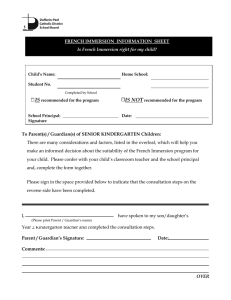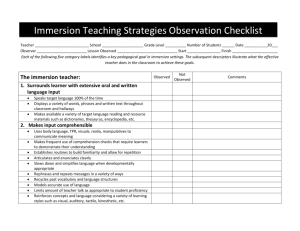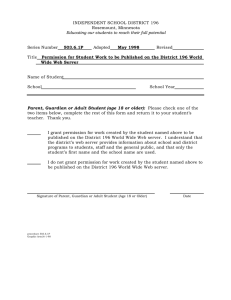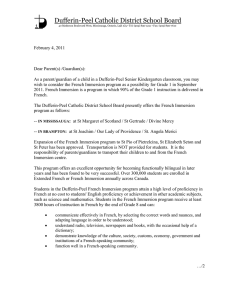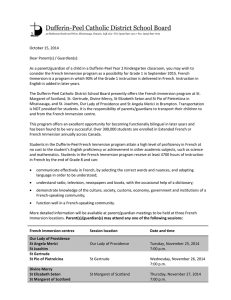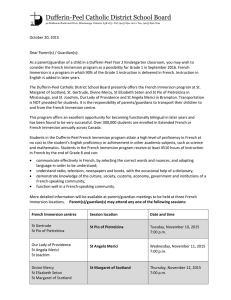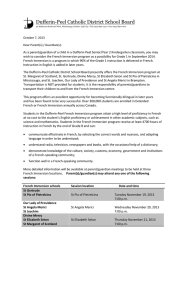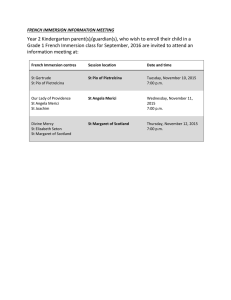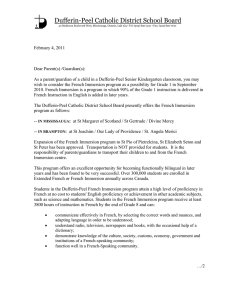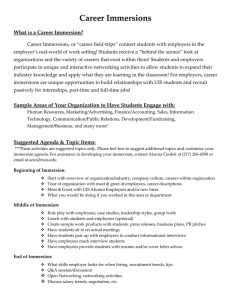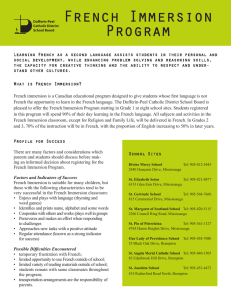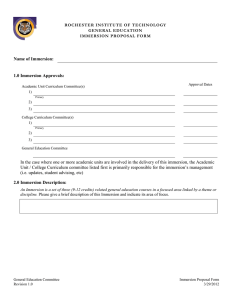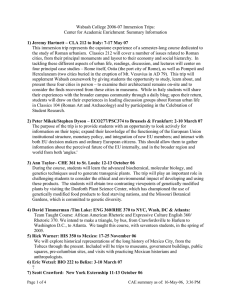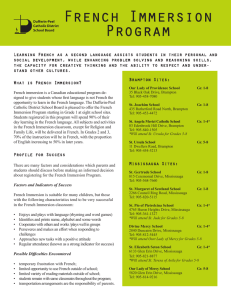PARENT/GUARDIAN GUIDE TO EXTENDED FRENCH
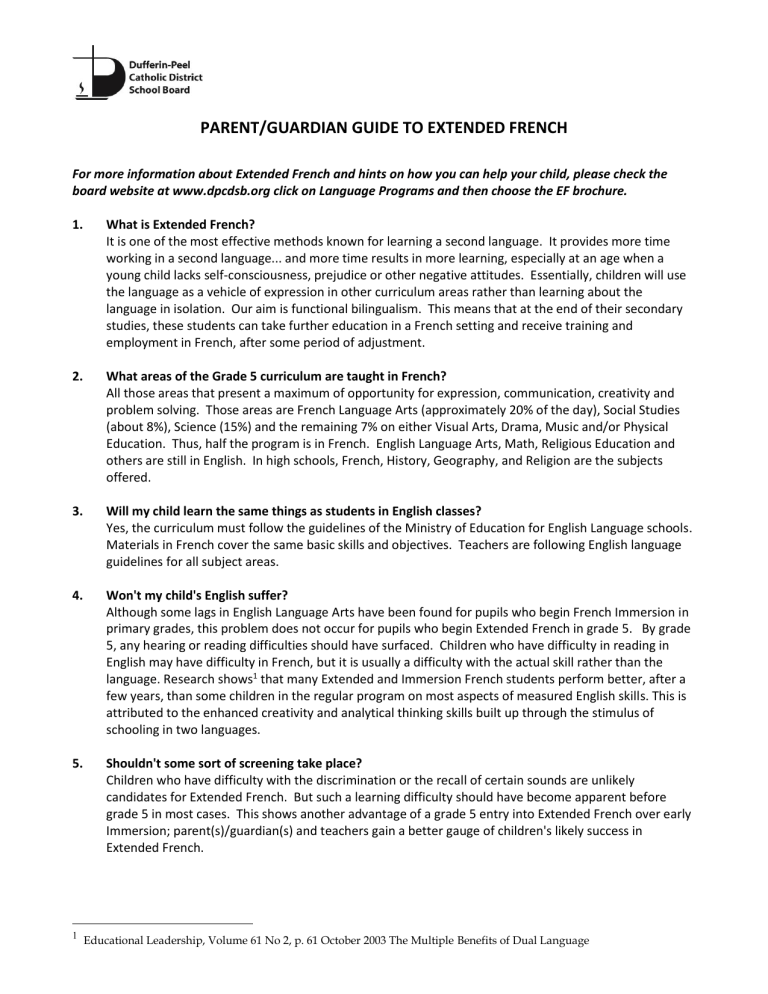
PARENT/GUARDIAN GUIDE TO EXTENDED FRENCH
For more information about Extended French and hints on how you can help your child, please check the board website at www.dpcdsb.org click on Language Programs and then choose the EF brochure.
1. What is Extended French?
It is one of the most effective methods known for learning a second language. It provides more time working in a second language... and more time results in more learning, especially at an age when a young child lacks self-consciousness, prejudice or other negative attitudes. Essentially, children will use the language as a vehicle of expression in other curriculum areas rather than learning about the language in isolation. Our aim is functional bilingualism. This means that at the end of their secondary studies, these students can take further education in a French setting and receive training and employment in French, after some period of adjustment.
2. What areas of the Grade 5 curriculum are taught in French?
All those areas that present a maximum of opportunity for expression, communication, creativity and problem solving. Those areas are French Language Arts (approximately 20% of the day), Social Studies
(about 8%), Science (15%) and the remaining 7% on either Visual Arts, Drama, Music and/or Physical
Education. Thus, half the program is in French. English Language Arts, Math, Religious Education and others are still in English. In high schools, French, History, Geography, and Religion are the subjects offered.
3. Will my child learn the same things as students in English classes?
Yes, the curriculum must follow the guidelines of the Ministry of Education for English Language schools.
Materials in French cover the same basic skills and objectives. Teachers are following English language guidelines for all subject areas.
4. Won't my child's English suffer?
Although some lags in English Language Arts have been found for pupils who begin French Immersion in primary grades, this problem does not occur for pupils who begin Extended French in grade 5. By grade
5, any hearing or reading difficulties should have surfaced. Children who have difficulty in reading in
English may have difficulty in French, but it is usually a difficulty with the actual skill rather than the language. Research shows 1 that many Extended and Immersion French students perform better, after a few years, than some children in the regular program on most aspects of measured English skills. This is attributed to the enhanced creativity and analytical thinking skills built up through the stimulus of schooling in two languages.
5. Shouldn't some sort of screening take place?
Children who have difficulty with the discrimination or the recall of certain sounds are unlikely candidates for Extended French. But such a learning difficulty should have become apparent before grade 5 in most cases. This shows another advantage of a grade 5 entry into Extended French over early
Immersion; parent(s)/guardian(s) and teachers gain a better gauge of children's likely success in
Extended French.
1
Educational Leadership, Volume 61 No 2, p. 61 October 2003 The Multiple Benefits of Dual Language
6. What provision is there for remedial or special education in Extended French?
Any services for pupils with learning difficulties are given in English. We are dealing with children learning French as a second language, not with Francophones. If a child is in need of extra help in
French, the classroom teacher will provide this as any other classroom teacher would.
7. Who teaches the program?
The Extended French teacher is bilingual, either because his/her first language is French or because he/she has acquired native-like fluency in French. But foremost, these teachers will be classroom teachers who have experience with children in the junior grades. Where numbers warrant, the children will have one teacher for the Extended French program and a second teacher for the English program.
Extended French teachers should be viewed as French speakers by the children. Otherwise, they will not feel the need to communicate in French.
8. What if my child has an accident and cannot communicate in French?
All teachers speak English and if necessary will do so in an emergency.
9. What type of accent will my child have?
Standard French vocabulary and structures are taught. Although a variety of accents exists in all languages, teachers all speak Standard or International French. As they progress through several years of Extended French, children are exposed to teachers from various parts of the world who are models of well-spoken French.
10. What if other children in the family are not in Extended French?
The problem can be with transportation or participation in after school activities. However, if the family recognizes that different programs are equally valid for each child then those problems should not be a major concern. Often, a younger child in Extended French stimulates an interest in French for the whole family.
11. Will Extended French affect my child's social development?
Studies have shown that such programs do not cause undue intellectual, emotional and social stress on children. While children in Extended French might tend to associate more with classmates from their own program outside the classroom, this is typical of all children.
12. Does it matter if parent(s)/guardian(s) cannot speak French at home?
No. But try and be positive at all times about the program, the teacher and the school. Express any questions or concerns you might have to the principal or teacher. Do encourage your child to watch
French television. Don't attempt to correct your child if you are uncertain of the exact pronunciation. If your child is eager to speak French at home, encourage him/her, but do not make it a chore.
Many of the above questions and answers have been adapted from "What is Immersion?", a booklet published by Canadian Parents for French, 309 Cooper Street, Suite 400B, Ottawa, Ontario K2P 0G5
Revised: November 2014
